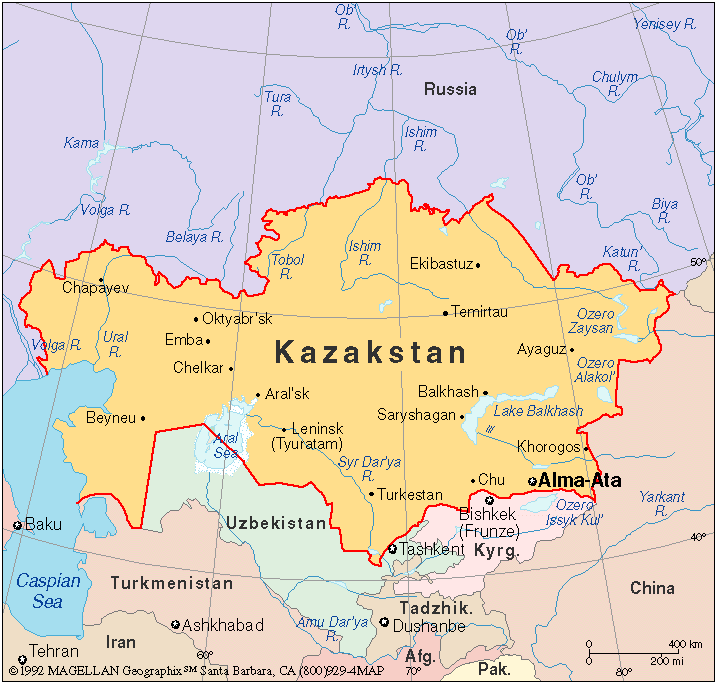 The financial crisis that began in the United States has made its presence felt around the globe and Central Asia is no exception. How is Central Asia’s greatest economic power, Kazakhstan, handling this economic crisis and how is the economic downturn affecting the stability, security, and development of the region. These were the main topics of a conference between many regional experts in Astana last month called “New Challenges and Kazakhstan’s Contribution to Stability and Security.”
The financial crisis that began in the United States has made its presence felt around the globe and Central Asia is no exception. How is Central Asia’s greatest economic power, Kazakhstan, handling this economic crisis and how is the economic downturn affecting the stability, security, and development of the region. These were the main topics of a conference between many regional experts in Astana last month called “New Challenges and Kazakhstan’s Contribution to Stability and Security.”
Muriel Mirak-Weissbach, a scholar of the region’s economic and strategic outlook attended the conference and not only summarizes the major issues and policies discussed, but also provides a historical perspective of past economic crisis’s in Kazakhstan. Here is an excerpt of what Nurbakh Rustemov, the keynote speaker and Chairman of the hosting parliamentary committee, had to say of the economic downturn and its consequences:
“He bluntly stated that the world financial crisis was leading to a “misunderstanding” among geopolitical forces, and carried the danger of a direct threat to humanity, through hunger and poverty.(1) He called for uniting forces internationally, to overcome the financial-economic crisis, which he dubbed the “number one priority.” Rustemov mentioned the Shanghai Cooperation Organization, of which Kazakhstan is a founding member, as well as the OSCE, which Kazakhstan will chair beginning 2010, as bodies his government would like to utilize to find solutions to the crisis. Two concrete means that his country could use to impact the crisis, would be in securing energy resources, and providing grain and meat exports to alleviate food shortages.”
Rustemov is correct in stating that this economic crisis may lead to following and connected geopolitical disruptions and he’s also right in arguing that regional and multilateral groups, such as the SCO and OSCE, will be crucial in helping the world get through this mess in one stable piece. Another important aspect of his comments is the positive role Kazakhstan can play in impacting the crisis in a productive way and that is in securing energy resources and in providing food stuffs to alleviate shortages in other countries, specifically in harder hit CA states, such as Kyrgyzstan, Tajikistan, and Afghanistan.
Kazakhstan’s abundance of energy supplies, combined with President Nazarbayev’s prudent planning, have left the nation in good condition despite the tough times. Nazarbayev announced last month that the government would spend $2 billion to stimulate the economy, mainly targeting banks and the construction industry, funds drawn from the nation’s oil fund. Unfortunately, not all CA or world states have an oil fund to fall back on.
What the whole of Central Asia can hope for is sturdy economic stewardship by its regional leader, Kazakhstan, and help from regional bodies, both from the East and West to weather what will most likely be a lengthy recession. During this time, it will be vital to keep the region from falling into disrepair as poverty and extremism would both be on the rise and this may lead to conflict. The US, Russia, China, and the EU all have roles to play in mitigating negative ramifications of this crisis in the region, but a strong and active Kazakhstan is crucial. As Muriel Mirak-Weissbach concludes:
“Kazakhstan has become the foremost interlocutor in Central Asia, not only for Eurasian giants Russia and China, but also for the two major economies of western Europe, Germany and France. If the current world crisis can be overcome through participation of major Eurasian nations, Kazakhstan can become the linchpin in the region for stability and security.”
In addition, the US State Department announced a nuclear safety cooperation with Kazakhstan. Read Below.
The United States and the Republic of Kazakhstan reached a new milestone in a multiyear joint project to irreversibly decommission the Soviet-era BN-350 fast breeder reactor located at the Kazakhstani port of Aktau on the Caspian Sea. The participating governments completed a sodium processing facility that will be used to dispose of coolant from the reactor core. This action demonstrates and reinforces the strength of the U.S.-Kazakhstani strategic relationship, and our joint commitment to preventing the proliferation of nuclear materials.